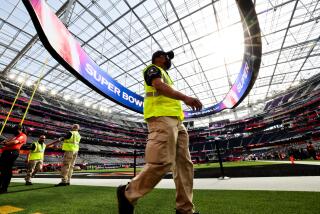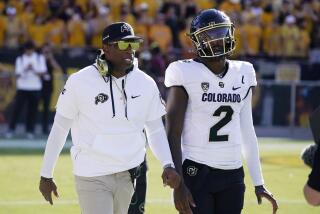State panel rejected injury claim by NFL’s Dorsett
- Share via
A brain-injury claim by former National Football League player Tony Dorsett was thrown out by a California workers’ compensation panel just months before he was diagnosed with early signs of chronic traumatic encephalopathy, a debilitating condition linked to repeated blows to the head.
The 59-year-old Hall of Fame running back’s claim was dismissed in May when a workers’ compensation judge ruled that because Dorsett had agreed to an $85,000 settlement for injuries to “multiple orthopaedic body parts” in 1991, he could not file another claim for any subsequent injury, state records show.
On Wednesday it was revealed that researchers at UCLA had found that Dorsett and two other former NFL players showed signs of CTE. The degenerative disease has been found in the autopsied brains of dozens of former NFL players, among them Junior Seau and Dave Duerson. But only recently have diagnoses in living subjects been possible.
Dorsett appealed that workers’ compensation decision, but it was upheld in August. A three-judge panel found that language in the 1991 settlement released the Dallas Cowboys and Denver Broncos from all future claims involving virtually any body part, including the head.
Mel Owens, Dorsett’s attorney, said Thursday that he was not available to discuss the case, which claimed cumulative head injuries but did not specify CTE. Owens had 45 days to appeal the decision to the California Court of Appeal, but court records indicate no such action has been filed.
Dorsett’s diagnosis is the latest high-profile case linking America’s richest professional sports league to brain injuries that appear years after players retire. Since 2006, more than 3,500 former NFL athletes have filed workers’ compensation claims in California alleging head and brain injuries, The Times found.
NFL teams routinely fight such claims, which can cost millions in cash awards and lifetime medical care. The league backed legislation signed last month by Gov. Jerry Brown that will bar many athletes from filing such claims in California.
Following brain scans and other tests, UCLA researchers informed Dorsett, along with Hall of Fame offensive lineman Joe DeLamielleure and three-time All-Pro defensive lineman Leonard Marshall of their diagnoses early this week. Dorsett spoke to sports network ESPN in a report Wednesday night.
“I want to know if this is something that’s come about because of playing football,” Dorsett said in the report, noting that his memory was slipping and he had problems controlling his temper. “It’s painful.”
All three athletes have filed claims in California.
Rich Dalyrimple, director of public relations for the Cowboys, declined to comment on the workers’ compensation case. “Our primary concern is for Tony Dorsett’s health and well being,” he said. A Broncos spokesman did not return calls seeking comment.
Records from the Division of Workers’ Compensation show that DeLamielleure filed a claim alleging head injuries against the Cleveland Browns and Buffalo Bills in 2010. In January, a workers’ compensation judge awarded him medical coverage and financial compensation, although the amount could not immediately be determined.
For his part, Marshall filed a head injury claim in California in 2009 and settled with the Washington Redskins at the end of 2010. That amount was also not available at press time.
Attorney Owens, a former Los Angeles Rams linebacker, represented both players in those cases as well. Unlike Dorsett, however, neither athlete had filed prior workers’ compensation claims in California, records show.
One athlete with a brain injury claim who had previously won a workers’ compensation award in California, however, is Jimmie Giles, a pro-bowl tight end in the 1970s and 1980s with the Tampa Bay Buccaneers, among other teams.
In 1991 Giles accepted a $75,000 settlement from five NFL teams for numerous orthopedic injuries to his back, wrist, ankles and knees among other parts — described in a medical report at the time as involving “virtually the entire musculoskeletal system.” Among the listed body parts was Giles’ head.
Roughly five years ago, Giles, who turn 59 on Thursday, began complaining of memory loss and other problems and was eventually diagnosed with initial symptoms of dementia, which is progressing steadily.
He filed a brain injury claim in California in 2010 and in late September, a workers’ compensation judge dismissed the claim. Like in Dorsett’s case, a workers’ compensation judge found that boilerplate language in the settlement precluded future injury claims.
The document, in part, reads, “employee releases and forever discharges said employer…from all claims or causes of action, whether now known or ascertained, or which may hereafter arise or develop as a result of said injury.”
Los Angeles attorney Ron Feenberg, who is representing Giles, is appealing the decision. Neither Giles, “the defendants, medical science nor the law knew the existence of a relationship between high velocity bodily impacts and brain injury,” Feenberg wrote in the appeal, filed last month.
He argues that the case draws strong parallels to asbestos-related claims because it take years for symptoms to surface.
In some cases, workers exposed to asbestos had reached workers’ compensation settlements for asthma claims only to file asbestosis or mesothelioma claims decades later. The courts ultimately allowed those cases to proceed.
“How can you release your right to a claim for a condition that hasn’t manifest itself?” Feenberg said. If Giles’ appeal is successful, it could open the door to many more claims from athletes who long ago accepted workers’ compensation awards only to develop serious brain disease years later.
Another of Feenberg’s clients, former Minnesota Viking linebacker Fred McNeill, was diagnosed with symptoms of CTE by the same group of UCLA researchers in January. McNeill has no prior workers’ compensation claims and Feenberg said a trial could begin by late January. Still, he worries about how to handle the case.
McNeill, 61, has advanced cognitive dysfunction, Feenberg said, and had severe difficulties with memory and basic conversation.
“I don’t even know if I can put McNeill on a witness stand,” Feenberg said.
More to Read
Inside the business of entertainment
The Wide Shot brings you news, analysis and insights on everything from streaming wars to production — and what it all means for the future.
You may occasionally receive promotional content from the Los Angeles Times.










